The Magnificent Seven
by Graham HaysFor SEC heptathlon champion Beatrice Juskeviciute, the path toward representing Lithuania in the 2024 Paris Olympics runs through Nashville
Heptathletes measure their lives by a seemingly dizzying array of numbers. They think about tenths of seconds in the hurdles, centimeters in the high jump and meters in the javelin. All of it in pursuit of thousands of points in a scoring system unique to heptathlon—a combination of seven track and field events spanning disciplines of running, throwing and jumping.
Success requires a relentless commitment to those numbers, a passion not just for competing but mastering the smallest detail in hopes of unlocking incremental improvement. Those who choose to compete in “multis,” as events like heptathlon are casually known, are wired “a little differently,” as Vanderbilt assistant coach and multis coordinator Justin Byron explains it.
Within the small subset of track and field athletes willing to live that life, Beatrice Juskeviciute stands out. The graduate transfer, who won two Ivy League titles at Cornell, won the SEC heptathlon championship last month and is among the favorites for a national title. And she stands out even in moments when people looking to catch a few minutes of sleep or watch a movie wish she might consider standing down. On a bus ride this season, an exasperated coach, captive to Juskeviciute’s never-ending stream of technical questions and track and field thoughts, finally started loudly singing to drown out her queries.
“She wants to talk about track so much,” Byron chuckled, recalling the encounter. “She wants to know what everyone in the world is doing. She has all the rankings, all the numbers. She knows everyone else’s personal record. It’s like a computer, a little track and field computer.”
Yet, the times, distances and points tell only part of the story of Juskeviciute’s pursuit of excellence. Other numbers, tattooed on her skin, begin to explain why she does it. They are the longitude and latitude of Kaunas, Lithuania’s second-largest city and her hometown. That is her starting line. And in heptathlon, once you start, you must keep moving forward.
Contested over two days, the heptathlon is a series of challenges that test a person’s limits and offer the opportunity to learn what she is capable of accomplishing. It is less an event than a journey. In that sense, for Juskeviciute, the heptathlon is life. From Kaunas, she traveled to the United States to study, train and compete. She determinedly earned her way to Austin, Texas, for this week’s NCAA Outdoor Track and Field Championships. She may soon continue to Budapest, Hungary, for the 2023 World Athletics Championships and to Paris for the 2024 Olympics—all in an effort to discover exactly how far she can go. To reach the far-flung limits of her potential.
Juskeviciute is a graduate transfer completing her only remaining year of eligibility, so Vanderbilt is just one stop on the journey—and not a long stop at that. But it was one she needed to make, one that taught her something important.
“I’ve realized how important it is to have your support system, in the sense of someone who believes in you more than you believe in yourself and believes in you being able to do things that you don’t necessarily feel you can,” Juskeviciute said of her year as a Commodore. “I’ve stepped into a new school, a lot of people didn’t know me. But it didn’t take them long to get behind me, push me and believe in me so wholeheartedly that I started believing in myself.
“I think that was one of the biggest transformations—the biggest thing that changed this year was just my belief in myself. That was when everything started happening.”
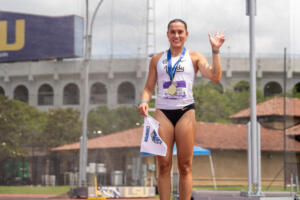
"When you talk about putting an athlete with that type of motor, that level of competitiveness right and that determination in the strongest conference in the nation, against some of the best athletes in the nation, she rises to the occasion because of who she is. You’re giving her an opportunity to compete against the best, and she wants to be the best."
Vanderbilt track and field assistant coach Justin Byron
The Accidental Heptathlete
At least as far as heptathlon goes, the 2023 NCAA Outdoor Track and Field Championships might have an entirely different look if Juskeviciute were a slightly more convincing liar.
As a girl, she didn’t aspire to compete in any form of track and field, let alone one of the most physically and mentally demanding events in all of sports. Growing up in Kaunas, she enjoyed volleyball—a good indoor fit for dreary, wet Baltic winters. Other than competing in an annual cross-country championship, she tried to keep her distance from competitive running.
“Track just seemed boring,” Juskeviciute said. “I didn’t want to go run laps around and around. I was like, ‘I can do this once, but I don’t want to practice it.’”
When she was about 14 years old, a coach asked her to think about joining the local youth track club. She demurred, saying she was going on vacation. The coach then asked for her phone number so they could chat about it when she returned. Juskeviciute gave a made-up number, but when the coach asked her to repeat it, she couldn’t remember the dummy digits. Stuck, she handed over the real number and soon joined the club. For the first year, she ran sprints and hurdles. Far from hating running around in circles, she enjoyed it—specifically, she enjoyed being very good at it.
The club she trained with had an annual Christmas pentathlon tradition. (Primarily an indoor track event, the pentathlon consists of a sprint hurdle race, 800-meter race, shot put, long jump and high jump, while the heptathlon adds the javelin and a 200-meter race.)
Jusckeviciute was game, even though she was small and not used to throwing anything much heavier than a volleyball. She initially struggled with the shot put, but she loved the competitive fix provided by so many different events. Soon she was competing primarily in the multis. By the time she was 16, she finished in the top 20 in the 2016 European U18 Championships. Soon after, she traveled to the renowned IMG Academy in Florida for a camp. Impressed, coaches there invited her to return to train full time and attend the academy’s boarding school. She did, spending her final year and a half of high school in the U.S.
“Now, it seems crazy to move from different continents when you’re 16—away from family. Nobody was here,” Juskeviciute said. “But I don’t think I thought about it that much. I don’t remember having any sort of fears or having a hard time.”
Meeting a Mentor
Ithaca, New York, isn’t usually on the most direct route to the heights of track and field, but Juskeviciute chose Cornell because of the academic opportunities it afforded—and because coming from Europe, the nuances of different levels of competition within even Division I track and field weren’t second nature to her. From the outset, she was a big fish in a small pond. As a freshman, she won the Ivy League heptathlon championship and finished 19th in the country.
The next year, she was warming up in New Mexico during the 2020 NCAA Indoor Track and Field Championships when the competition was canceled amid the COVID-19 pandemic.
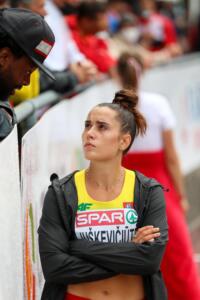 While most Division I schools returned to something approaching regular athletic competition by the following spring, Ivy League programs remained largely on hiatus for the entirety of the 2020–21 academic year. Juskeviciute competed in just one regular season meet for the Big Red, but she still finished eighth in the NCAA Outdoor Track and Field Championships. And as a senior, she again won the Ivy championship and improved to seventh in the nation.
While most Division I schools returned to something approaching regular athletic competition by the following spring, Ivy League programs remained largely on hiatus for the entirety of the 2020–21 academic year. Juskeviciute competed in just one regular season meet for the Big Red, but she still finished eighth in the NCAA Outdoor Track and Field Championships. And as a senior, she again won the Ivy championship and improved to seventh in the nation.
Juskeviciute loved her time in Ithaca. She found her academic passion in health care and health equity, which she continues to pursue through Vanderbilt’s master’s program in Medicine, Health and Society. While she struggled through the pandemic interruptions, at one point unsure she would be allowed to re-enter the United States if she went home, she credits the time for helping her get stronger, fitter and, most challenging of all, more patient.
But perhaps the most important factor at Cornell is that it was where she began working with Byron, who was the assistant coach responsible for sprints and jumps when Juskeviciute was a freshman.
When the head coach who recruited her and assistant coach coordinating multis left Cornell after her freshman year, she thought about leaving too—perhaps even returning to Lithuania. She decided to stay on one condition—that Byron agree to coach her in multis. Byron had remained at Cornell after the coaching change and the two had worked together on specific disciplines. Student-athletes in the combined events regularly work with the coaches responsible for specific disciplines, spending one practice working with the sprinters, another with the throwers, etc. But taking the lead in training a heptathlete was all new to him.
“He sees everyone as an individual, and there’s no one-size-fits-all approach,” Juskeviciute said. “I’m always impressed how he juggles so many things at the same time, because there are six people at practice and everyone is doing a different thing. He’s there with three stopwatches. But he was able to tailor everything to me in our work. There were a lot of events that I should have been good at, but I was struggling … because something wasn’t quite clicking. Long jump, I was struggling for a long time. The 200, same thing. His ability to focus on what I needed, particularly to fix that or to get through that little bump, has helped tremendously.”
At a meet in Estonia in 2021, Vanderbilt director of cross country and track and field Althea Thomas offered Byron a job that he couldn’t turn down—working for a rising star of a head coach at an up-and-coming program in the best track and field conference in the country. It was a blow for Juskeviciute, who was about to enter her senior year at Cornell, but she calculated numbers and scenarios and quickly made peace with it: She knew she would likely use her final season of NCAA eligibility elsewhere after earning her Cornell degree, and if she already knew someone who was established in the SEC? All the better.
“I love the new coaching staff here, and I really saw what Vanderbilt was trying to build and where they are going,” Juskeviciute said. “Everything here just seemed like it would really set me up for success. So it was never really a question. I knew that Coach Byron was going to be the person who was going to get me closer to my goals. Whether it’s the Olympics, whether it’s Worlds or whether it’s my personal bests, I knew he was going to be the person.”
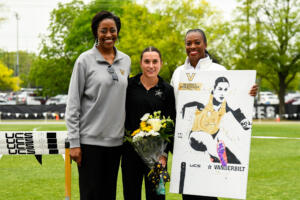
Juskeviciute with Vice Chancellor Candice Lee, left, and track and field director Althea Thomas, right.
Lift Off at Vanderbilt
Reflecting the physics at work in many of the events, world-class heptathletes are often tall. Reigning Olympic heptathlon gold medalist Nafissatou Thiam is 6 feet tall. Longtime world record holder and American legend Jackie Joyner-Kersee is 5-foot-10.
Among the first things you notice about Juskeviciute is that she stands just 5-foot-5. The next thing likely will be how little that matters. Byron has lost track of how many colleagues approach him at meets to ask how someone that small runs so fast, jumps so high and throws so far.
The answer comes down to revolutions per minute, figuratively and sometimes literally.
“You don’t typically see athletes with that kind of motor,” Byron said. “She’s relentless. As a coach, your job with a lot of athletes is to motivate them and get them going. With Beatrice, your job is to save her from herself. She wants to do one more. And then she wants to do 10 more. And then she wants to run again.
“I’ve never coached anyone with this level of discipline. This is what a professional athlete is.”
At Vanderbilt, Juskeviciute found an environment ready to help her fine-tune that motor and make it run as efficiently as possible.
She may have struggled with the shot put when she first took up heptathlon, but by the time Juskeviciute got to college, the throws were her greatest strength, and it was the sprint and jumps that were the weak links. She would regularly come out of the hurdles, always the first event, in last place and then rescue a top-10 finish over the final six events, Byron said. But this year, working with Thomas’ sprinters, she’s smashed her personal bests in the hurdles, the 200 and the long jump. And she’s learned to expect that of herself.
In the NCAA Indoor Championships, she ran the hurdles faster than any competitor. She was so excited, Byron recalled, that it wrecked her focus in the next event, the high jump. But when she ran the fastest time in the heptathlon hurdles in the recent SEC Championships and set a personal best in the long jump, she barely cracked a smile. Her mind was already focused on the next event.
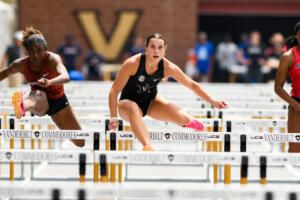
In addition to helping Juskeviciute tackle her weaknesses, Vanderbilt has boosted her strengths. She was already a good collegiate shot putter. But Vanderbilt throwers have emerged as a national force under associate head coach Ashley Kovacs, who also coached her husband, Joe, to a world championship and Olympic silver medal in shot put.
Juskeviciute trusted Kovacs’ expertise in breaking down her throwing motion and building it back into something that offered more room for growth. That wasn’t always comfortable. In her first few meets, she didn’t throw as far. But by the SEC Championships, she had the longest throw by more than a meter—the gap between first and second place was bigger than the gap between second and seventh.
“When you talk about putting an athlete with that type of motor, that level of competitiveness and that determination in the strongest conference in the nation, against some of the best athletes in the nation, she rises to the occasion because of who she is,” Byron said. “You’re giving her an opportunity to compete against the best, and she wants to be the best.
“Then you talk about the structure and environment that Coach AT is building at Vanderbilt, that’s another box checked. We’re going to do everything that we can to make sure that you’re elite, from having a nutritionist travel with us to making sure there’s always a massage available to making sure you got more gear in this one year at Vanderbilt than you’ve ever seen.”
Empowering a Global Platform
While her immediate focus remains on winning an individual NCAA championship, Juskeviciute wouldn’t be a heptathlete if she shied away from multitasking. She readily acknowledges next summer’s Paris Olympics are a goal, maybe even the World Championships that take place this August in Budapest.
 She must still reach the qualifying standard of 6,480 points during a recognized event. She won the SEC title with a career-best 6,079 points. Coming from a small country, that would likely be enough to assure her a place—unlike the United States, Lithuania is unlikely to have more than three competitors, the maximum for the Worlds or Olympics, meet the qualifying standard.
She must still reach the qualifying standard of 6,480 points during a recognized event. She won the SEC title with a career-best 6,079 points. Coming from a small country, that would likely be enough to assure her a place—unlike the United States, Lithuania is unlikely to have more than three competitors, the maximum for the Worlds or Olympics, meet the qualifying standard.
Coming to Vanderbilt has helped her get closer to that number, the one that will unlock the opportunity to compete at the very highest level of the sport. But for Juskeviciute, it has also helped her get closer to fulfilling the opportunity symbolized by those tattooed numbers.
Austra Skujyte is Lithuania’s only female track and field Olympic medalist; she won heptathlon silver and bronze in 2004 and 2012, respectively, after winning multiple NCAA championships at Kansas State. Juskeviciute will focus on getting to the Olympics before worrying about winning medals there, but it’s notable that she would be the first female track and field medalist born in an independent Lithuania. Skujyte was born in what was then still the Soviet Union.
Merely being from Lithuania offers Juskeviciute a path to the Olympics. But as her tattoo suggests, it’s important to her that the Olympics offer a path to show a global audience what it means to be from Lithuania—to be Lithuanian.
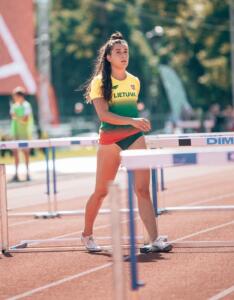 Byron recalls Juskeviciute calling him in tears after Russia’s invasion of Ukraine in February 2022. She told him she didn’t know if she could go to the NCAA Championships. She felt hollow playing what amount to games far from home when people with a shared history—Kaunas is barely 500 miles from Kyiv—were being murdered.
Byron recalls Juskeviciute calling him in tears after Russia’s invasion of Ukraine in February 2022. She told him she didn’t know if she could go to the NCAA Championships. She felt hollow playing what amount to games far from home when people with a shared history—Kaunas is barely 500 miles from Kyiv—were being murdered.
“I had never heard her talk about anything else as passionately,” Byron said. “She only ever talked about track with that much passion.”
He advised her to follow her instincts, but also to think about track and field as a platform for a nation whose people are keenly attuned to events in Ukraine. She’s unequivocally proud to be a part of the new energy and championship foundation that Thomas has instilled at Vanderbilt, but no matter what uniform she wears, she always competes for Lithuania. As a Lithuanian.
“Even though I didn’t experience it myself, my grandparents, my mom did, and I hear those stories,” Juskeviciute said of the country’s past. “It does make me so proud of where I come from. I think it just gives me a lot of courage to think of what my family had to go through and where I am right now. It just makes me more grateful. Even though I personally didn’t experience these things, my family experience makes it personal.”
Every point she’s added to her score at Vanderbilt made it just a little easier to tell that story.
Not Done in Nashville
For the time being, she will extend her sojourn in Nashville. She will complete her master’s program in August, then remain in the city to continue training with Byron and stay close to the support system at Vanderbilt.
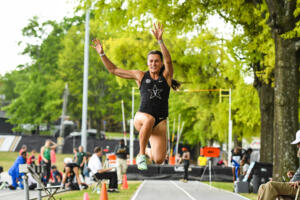
There are more meters to add, more seconds to shave, more points to squeeze out of two days of physical and mental tests that are unlike much else in sports. She’ll continue to measure life by the numbers. Her journey brought her here, and this place gave her the tools to keep going.
Because she knows where she is from. And where she wants to go.
“Adversity is always my word for multis,” Byron said. “I tell all of them, ‘For you to complete this event once, let alone come back and do it again and again, it’s almost like being a Navy SEAL. You are set up better than anyone else in the world.
“There’s nothing in life that should stop you if you do the heptathlon.”

